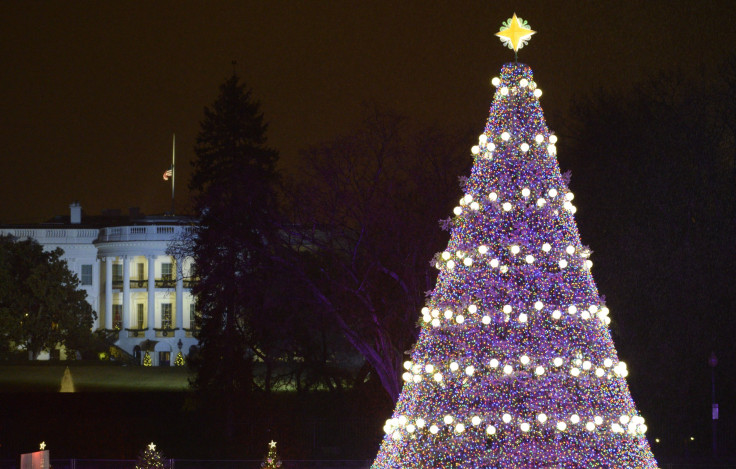Are Christmas Lights Really Slowing Down Your Wi-Fi?

Tuesday morning saw a slew of headlines -- like this, this, this and this -- all breathlessly warning you that those twinkling Christmas lights you drape in every available corner of your house could be the reason your Wi-Fi speeds slow to a crawl over this festive season. That, of course, could make it a lot harder to download National Lampoon’s Christmas Vacation and find out that Chevy Chase was just as funny as you remembered.
The reason for the headlines was a report from U.K. telecom’s watchdog Ofcom on the state of broadband services in the country, warning that consumers' broadband speeds may not be as fast as they should be, for a variety of reasons. “It could be down to something as simple as interference from other electronic devices, such as a microwave oven, baby monitor, a lamp -- or even Christmas fairy lights,” a press release claimed.
This was the only reference to the Christmas light phenomena in the report, and Ofcom offered no real explanation for why this is the case, so let's dig a little deeper to see if Ofcom's claim holds water.
This All Sounds Very Familiar
If you are getting a feeling of deja vu reading all those headlines, there is a good reason. We have heard all this before. Indeed, we've been hearing it on and off for more than a decade. Ars Technica warned us about "Wi-Fi-blocking decorations" back in 2006, based on research from AirMagnet, a company that (surprise, surprise) develops and sells Wi-Fi networking analysis and troubleshooting tools.
In 2009 it was the turn of TalkTalk, the U.K. telecom company recently in the news for a customer data breach, to warn us that "a significant percentage of complaints [about Wi-Fi speeds] were due to interference from Christmas lights," according to a Telegraph report.
So Why Is Ofcom Telling Us Again?
Ofcom is repeating the warning as part of the launch of its Connected Nations report, which claims that people and businesses are not getting the best out of the broadband connection they have. To help, they have launched a Wi-Fi Checker app that will scan your home network and let you know if there are any issues.
Is There Any Truth To The Claim About Christmas Lights?
There is no smoke without fire, and almost a decade of warnings mean Christmas lights do affect your Wi-Fi connection to some extent -- but the question remains: How do Christmas lights interfere with and slow down Wi-Fi networks?
Just like the Ofcom report, TalkTalk failed to give a reason why Christmas lights were a problem, but back in 2006, AirMagnet said the problem was caused by "deflecting, absorbing or otherwise interfering with the wireless signal."
The exact reason is down to electromagnetic radiation. Everything that has electricity running through it creates an electromagnetic field, and this interferes with devices that use electromagnetic waves to carry information or impart energy. In the case of your router, it is using electromagnetic waves to send information, while your Christmas lights generate an electromagnetic that which interferes with it. Place your Christmas lights too close to your router and you will get some interference.
Does That Mean I Have To Have A Fairy-Light-Free Christmas?
Getting rid of your Christmas lights will not only make you seem like the Grinch to all your neighbors, it will also have a negligible impact on your Wi-Fi speeds. While TalkTalk's 2009 report claimed that in-home lighting and wiring, such as Christmas tree lights, could degrade speeds by as much as 25 percent (with flashing Christmas lights causing even more difficulties), this is an extreme example.
For Christmas lights to have this significant an impact, your router would have to be draped in flashing lights while dangling from the top your Christmas tree -- and there are much worse things affecting your Wi-Fi speed.
What Else Hinders My Netflix Enjoyment?
Everything in the home, from your microwave to baby monitors, lamps and the water pipes running though your walls, will also affect how well your Wi-Fi network operates. In its white paper on Wi-Fi myths, Cisco (which should know a thing or two about wireless networks) says interference can be caused on the 802.11 network that your Wi-Fi network works on by a huge range of appliances. These include devices mentioned by Ofcom (though not Christmas lights) as well as cordless phones, Bluetooth devices, wireless video cameras, outdoor microwave links, wireless game controllers, Zigbee devices, fluorescent lights, WiMAX devices and bad electrical connections.
On a scale of 1 to 10, Christmas lights are probably a 3, while microwaves would be a 9, other Wi-Fi networks a 7 and even the human body (because we are made up of more than 60 percent water) would be a 5.
What Can I Do To Limit Interference?
For Christmas lights, the simplest thing to do is to keep them as far from your router as possible. Additionally, if you pay a little bit extra you may get lights with electrical cables that are more insulated than cheaper models, which will help limit interference. Finally, if you have regular lights rather than blinking ones, this should also help prevent Wi-Fi slowdown.
In general it is advisable to place your router as centrally as possible in your home, as it emits its signal in all directions. Secondly, if you have a newer router that supports both the 2.4GHz and 5GHz frequencies, it is better to use the latter, as it is much less congested, and home appliances won't interfere nearly as much. Finally, it is always best not to place your router inside your microwave if possible, or underneath the TV or on top of your PlayStation 4 or inside a concrete block, if you want to optimize speeds.
Of course, you could always wait for Li-Fi-enabled Christmas lights to come on the market.
© Copyright IBTimes 2025. All rights reserved.




















